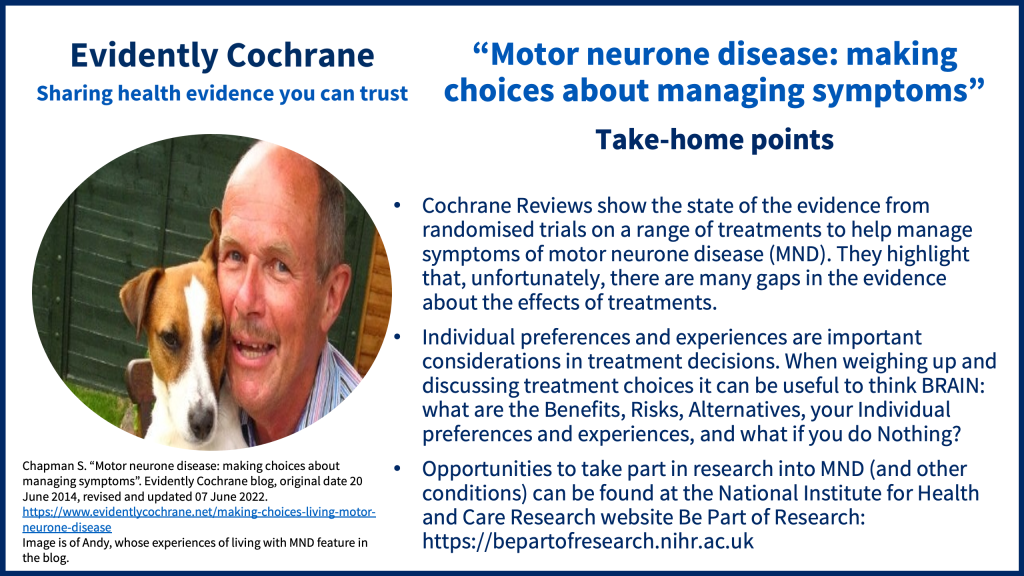June is Motor Neurone Disease (MND) Awareness Month. Sarah Chapman revisits her blog about one man’s experience of MND and the Cochrane evidenceCochrane Reviews are systematic reviews. In systematic reviews we search for and summarize studies that answer a specific research question (e.g. is paracetamol effective and safe for treating back pain?). The studies are identified, assessed, and summarized by using a systematic and predefined approach. They inform recommendations for healthcare and research. on treatments to help manage symptoms of MND.
Page originally published: 20 June 2014. Revised and republished to include new evidence and resources: 07 June 2022. Page last updated 10 August 2023.
Take-home points


Back in 2014, I talked to my colleague Carly about her late stepdad Andy, his experiences of motor neurone disease (MND) and the available evidence on treatments to help manage symptoms, and wrote a blog about it. Since then, some of the evidence has been updated as new studies have been done, and here I revisit these and other Cochrane ReviewsCochrane Reviews are systematic reviews. In systematic reviews we search for and summarize studies that answer a specific research question (e.g. is paracetamol effective and safe for treating back pain?). The studies are identified, assessed, and summarized by using a systematic and predefined approach. They inform recommendations for healthcare and research., and Andy’s story.
What is MND?
Motor neurone disease (MND) is a rare progressive disease that attacks the nerves in the brain and spinal cord. Amyotrophic lateral sclerosis (ALS), which Andy had, is the commonest form of motor neurone disease. MND can affect lots of basic functions such as walking, talking and breathing. Sadly there is no cure, but some people live with it for years, and there are treatments that can help with some of the effects of the disease.
“A never-ending flow of saliva” – what can be done?
This was a really miserable problem for Andy, if only in the last weeks. Carly told me “Mum said they had to resort to stuffing a tea towel under his chin to stop the never-ending flow and to hold his head up.” Is there any help for this?
The Cochrane Review Treatment for sialorrhea (excessive saliva) in people with motor neuron disease/amyotrophic lateral sclerosis (May 2022) is bang up-to-date but highlights that there is (still) only a little evidence to guide treatmentSomething done with the aim of improving health or relieving suffering. For example, medicines, surgery, psychological and physical therapies, diet and exercise changes. choices here.
Botulinum toxin (Botox) injections into the salivary glands may help, according to a small studyAn investigation of a healthcare problem. There are different types of studies used to answer research questions, for example randomised controlled trials or observational studies., with a probable reduction in the amount of saliva produced at eight weeks after the treatment. It may have no more side effects than a placeboAn intervention that appears to be the same as that which is being assessed but does not have the active component. For example, a placebo could be a tablet made of sugar, compared with a tablet containing a medicine. injection (a liquid without the active ingredient).
Another small study suggests that a combined drug treatment (dextromethorphan hydrobromide and quinidine sulfate, known as DMQ) may slightly improve drooling. The review authors say that the side effects most often experienced were nausea, dizziness, constipation and diarrhoea, but that these may be no more common with DMQ than with placebo.
The effects of scopolamine (hyoscine) patches remain unclear.
When swallowing becomes difficult…

Many people with MND get to a point where swallowing becomes really difficult, and then ‘tube feeding’ may be offered. A tube can be put through the abdominal wall into the stomach; this is also known as percutaneous endoscopic gastrostomy, or PEG.
Carly told me that Andy had a PEG and that although it didn’t stop him losing weight it gave him vital calories and fluids when swallowing was very difficult. “This was the biggest blow for him, being such a foodie. He stopped cooking a year earlier because he couldn’t walk or stand up and then he had to give up all the food he loved!”
The Cochrane Review on this, Enteral tube feeding for amyotrophic lateral sclerosis/motor neuron disease, was most recently updated in August 2023 with the authors finding there are still no randomisedRandomization is the process of randomly dividing into groups the people taking part in a trial. One group (the intervention group) will be given the intervention being tested (for example a drug, surgery, or exercise) and compared with a group which does not receive the intervention (the control group). studies to include. They have included some non-randomisedA non-randomised study is any quantitative study estimating the effectiveness of an intervention (harm or benefit) that does not use randomisation to allocate people to comparison groups. studies, which they say provide only weak evidence that PEG offers a nutritional advantage. The NICE guideline on Motor neurone disease: assessment and management (updated July 2019), which has been informed by 17 Cochrane Reviews, advises “Discuss gastrostomy at an early stage, and at regular intervals as MND progresses, taking into account the person’s preferences and issues, such as ability to swallow, weight loss, respiratory function, effort of feeding and drinking and riskA way of expressing the chance of an event taking place, expressed as the number of events divided by the total number of observations or people. It can be stated as ‘the chance of falling were one in four’ (1/4 = 25%). This measure is good no matter the incidence of events i.e. common or infrequent. of choking. Be aware that some people will not want to have a gastrostomy.”
Supporting breathing: mechanical ventilation can help
Supporting breathing with mechanical ventilation can be really important to people with MND, potentially improving quality of life and survival. For some years, the most usual type of mechanical ventilation has been non-invasive ventilation (NIV), using a mask connected to an air pump machine, and this is what the NICE guideline says should be offered.
Carly told me that Andy only tried NIV a week before he died, hated it and decided not to use it. However, the Cochrane Review Mechanical ventilation for amyotrophic lateral sclerosis/motor neuron disease (October 2017) has some evidence that it may be a good option for some people, especially those who don’t have severe problems with ‘bulbar function’ – in other words, the muscles used for chewing, swallowing, and talking are still working.
It’s disappointing that there are dataData is the information collected through research. from only one small study, but this evidence suggests that non-invasive ventilation, compared with ‘standard care’, probably significantly prolongs survival and improves or maintains quality of life in people with ALS/MND who have normal or only moderately impaired bulbar function (but not those with poor bulbar function).
But, there was no information about possible unwanted effects of mechanical ventilation and the review authors say it’s important that future research studies report on this. They also note that research will need to focus on finding out what the most beneficial NIV treatment looks like – when to start it, for example. They say that not offering NIV to a control group is no longer ethically justifiable, so we don’t expect to see more studies like the one in this review.
More evidence gaps, and work to address them
These Cochrane Reviews, along with others on treatments for symptoms for people with MND, were brought together in an overview: Symptomatic treatments for amyotrophic lateral sclerosis/motor neuron disease (January 2017). Disappointingly, it concludes there is “a lack of robust evidence” across the board. There is scope for better evidence to come, and indeed some of the reviews it includes have been updated (such as the one on excessive saliva) or are in the process of being updated.
Making choices: it’s not just about the evidence
Andy’s experiences, as told to me by Carly, are a reminder of how important individual factors are, including priorities, preferences and experiences. It’s good to see this spelled out in the NICE guidance too. A useful way of thinking through, and discussing, treatment choices can be to think BRAIN:
- What are the Benefits?
- What are the Risks?
- What are the Alternatives?
- What are my Individual preferences and experiences?
- What if I do Nothing?
This could help you discuss choices with a health professional.
You can watch interviews with people talking about their experiences of MND on the Healthtalk website. You can also find information and support from the Motor Neurone Disease Association and on the NHS website.
Taking part in research
So often, reviews like these highlight huge gaps in the evidence, gaps which really do need filling to inform treatment choices.
Andy spent a year taking part in a drug trialClinical trials are research studies involving people who use healthcare services. They often compare a new or different treatment with the best treatment currently available. This is to test whether the new or different treatment is safe, effective and any better than what is currently used. No matter how promising a new treatment may appear during tests in a laboratory, it must go through clinical trials before its benefits and risks can really be known. and Carly’s Mum recalled that it really seemed to help him stay positive. Only when the trial ended and he discovered he’d been taking a placebo medicine was there a noticeable deterioration in his condition.
At the the National Institute for Health and Care Research (NIHR) Be Part of Research website, you can look for opportunities to take part in research in health conditions relevant to you. Currently they have four research research studies on motor neurone disease recruiting people to take part.
Sarah Chapman has nothing to disclose.



Has any research been undertaken on the effects of MND on bowel function.For my late husband after not being able to speak ( yes it was the bulbar type) to he inability to move his bowel regularly led to massive faecal impactaction which normal enemas had no effect on.
Hello, that must have been very miserable, along with everything else going on – so sorry. There isn’t a Cochrane Review that looks at this and the NICE guideline I mention in the blog doesn’t talk about it. I suspect that this is because this problem is not specific to people with MND. However, I did come across this research study, which may well be in progress still: https://www.hra.nhs.uk/planning-and-improving-research/application-summaries/research-summaries/changing-bowel-habits-in-people-with-mnd/
Best wishes,
Sarah Chapman
My sister has advanced MND and her throat is failing fast and she really struggles to eat and drink. She was supposed to have a PEG this week but the procedure went wrong and she has now decided not to have one at all. I am worried about how she will get any nutrients/energy/hydration. She and her family do not want to prolong her life but I am concerned about her being comfortable. I know this is complex but can you advise what if anything can be done so she is not hungry/thirsty in the coming weeks. Thanks x
Interesting, Carly’s stepdad only got Niv a week before he died. My sister is very disabled with MND, non verbal, can hardly swallow and has breathing difficulties, and will see a respiratory doctor for the first time 23/4/2021. Too little too late I think.
Thanks for this helpful information. My mum is 83 and has great difficulty speaking and swallowing much of anything. Food getting trapped in her throat and blocking her air way is happening more often. I was 15 seconds away from calling emergency services this evening as she battled for each breath. I think the PEG is the best next step but she doesn’t want that. My mum is very stubborn but I fear I’ll have to convince her before It’s too late.
This sounds so hard for you and your mum, Gavin. I’m glad you found the blog helpful. Wishing you both the very best.
Sarah Chapman [Editor]
I have only just had confirmation that I have MND after 6 months of tests. The most difficult part for me has been dysphagia and dysarthria, the former being the most destructive as being used to social eating has come as a hard blow. I survive now on liquid meals like complan and nutritious juices and it dominates my day as I am never hungry but worry if I’ve ever consumed enough to survive. Link this to incredibly thick saliva and phlegm that never leaves my throat and you have a perfect storm of difficult issues which is thoroughly depressing.
That sounds really hard Robert… We think it’s really important that we hear and share people’s stories alongside the evidence. Sometimes it helps to highlight where there are gaps. Wishing you all the best.
Sarah Chapman (Editor)